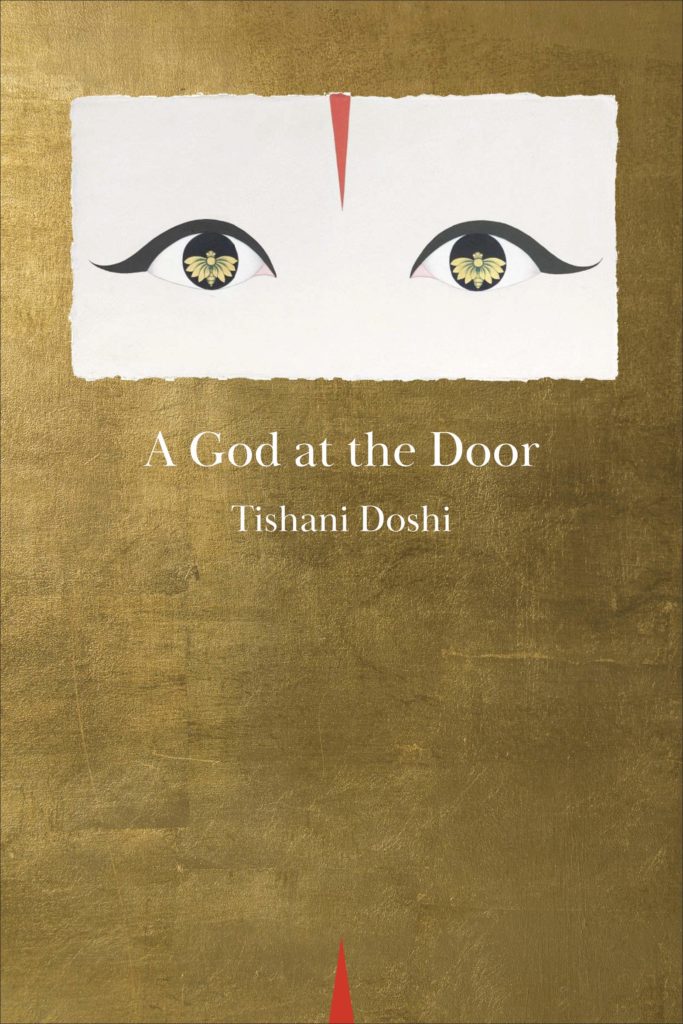A God at the Door by Tishani Doshi. Copper Canyon Press, 2021. $16, 128 pages.
This poetry collection is Tishani Doshi’s eighth book. The collection is separated into five sections and covers everything from war and the inevitability of death to systemic misogyny, most of it being inspired by events, people, or other published pieces from the past and present. As Doshi runs the gamut of topics, there seems to be no holistic order to the collection. Rather, it seems Doshi is allowing multiple streams of consciousness to intertwine in some way to give context to how we have ended up in this place of near extinction.
The third section is the only one with a cohesive theme from start to finish, with six poems entitled ‘Cell’, ‘Self’, ‘Collective’, ‘Nation’, ‘Species’, and ‘Cosmos’. This collection of poems is purposely placed in the center because each poem highlights the major themes that Doshi addresses throughout the rest of the book. ‘Cell’ starts this mini collection as a reminder to us that we are “not alone”, with the “mountain range in the north” and “the bacterial colonies of the south” that serve as an infinite landscape in these finite bodies. The second poem comments on the way that we often view our lives as “appalling”, yet somehow “any chance we get we emerge from the earth like cicadas to sing and fuck for a moment of triumph.” The relentless spirit of the self somehow does this for centuries to spite the “spies installed in adobe walls”, the “field of bones” being stepped over, and the inevitability of our species joining “the lost animals” in the “bunker of the earth”. As the section closes with ‘Cosmos’ there is this surreal sense of peace about how microscopic our own reality is despite the impact it has on our daily lives, as we sit in the center of “a black hole at the edge of forever”.
As a Professor of Literature and Creative Writing, Doshi’s understanding of poetry is obvious and she chooses to play with the format of her pieces using shape poems. This is one of the ways she incorporates a form of playfulness in pieces with difficult topics. For instance, ‘I Carry My Uterus in a Small Suitcase’ reads: “I carry my uterus in a small suitcase / for the day I need to leave it / at the railway station. / Till then I hold on / to my hysteria / and take my / nettle tea / with / gin.” Though it’s sarcastic, it still calls attention to the way in which we shame femininity and see it as weakness. This poem contrasts with another one appearing earlier in the collection, titled ‘The Comeback of the Speedo,’ which describes Doshi’s encounter with a man in a tiger-striped Speedo at her local sports club. Doshi notes how different Mr. G’s experience with his body is from hers because she knows that “to open our legs was treason”.
Doshi, again experimenting with format, leaves blank spaces right in the middle of sentences in some poems, asking readers to pause and process what they just read before continuing. This stylistic choice, at first read, doesn’t seem to work and can even be off-putting, but after a re-reading it’s clear that these pauses have a purpose and are her own reconstruction of the comma. She has created various lengths of pauses throughout multiple pieces, giving the reader time to fully digest the last few lines.
She does this in ‘Roots’, a piece which incorporates a line from the late Frida Kahlo’s diary that conveys her longing to experience “the vegetable miracle of my body’s landscape,” as a woman who expressed her struggle with infertility often throughout her art. This piece has purposely-placed indents and blank spaces to allow us to soak in the feelings of helplessness that infertility can create for women in this society, as fertility is often tied to womanhood itself. But Doshi argues in this poem that the sanctity of “planting your own body” to “be your own moveable oasis” and bearing life in a metaphorical way is just as feminine and necessary.
Readers not seeking to do extra research may not find this the best book to read, especially if they have no interest in dead artists or in contemplating the downward-spiralling state of this world, the problems of which seem fixable but which, for some reason, we are choosing not to fix. There are also multiple references to Hinduism and South Asian culture, but for readers with an interest in looking beyond the conditioned Eurocentric perspective, Dr. Doshi has been kind enough to create a note section so that readers can understand what events or stories inspired particular pieces.
This collection of poems seeks to help us reexamine the lens through which we view the world and find some room for hope to grow “as an organism inside us”, even if it’s “a noose around [our] neck.”
Taryn Young is a junior double majoring in Criminology and Psychology. Even though she is not an English major, reading has been just about a lifelong hobby along with fashion and cooking.
“And all I loved, I loved alone.”- Maya Angelou

